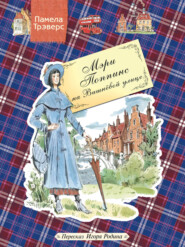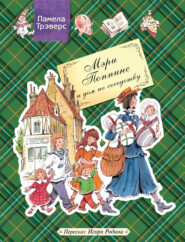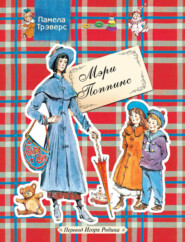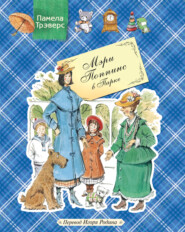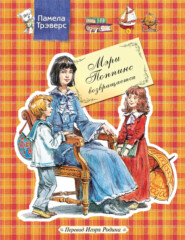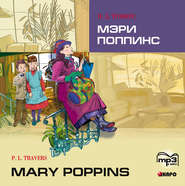По всем вопросам обращайтесь на: info@litportal.ru
(©) 2003-2025.
✖
Mary Poppins - the Complete Collection
Настройки чтения
Размер шрифта
Высота строк
Поля
She settled the Twins into the perambulator and pushed it down the garden path. Jane and Michael followed her out into the Lane.
“Where are we going today, Mary Poppins?”
“Across the Park and along the Thirty-Nine bus route, up the High Street, and over the Bridge and home through the Railway Arch!” she snapped.
“If we do that, we’ll be walking all night,” whispered Michael, dropping behind with Jane. “And we’ll miss Miss Andrew.”
“She’s going to stay for a month,” Jane reminded him.
“But I want to see her arrive,” he complained, dragging his feet and shuffling along the pavement.
“Step along, please,” said Mary Poppins briskly. “I might as well be taking a stroll with a couple of snails as you two!”
But when they caught up with her she kept them waiting for quite five minutes outside a fried-fish shop while she looked at herself in the window.
She was wearing her new white blouse with the pink spots, and her face, as she beheld herself reflected back from the piles of fried whiting, had a pleased and satisfied air. She pushed back her coat a little so that more of the blouse was visible and she thought that, on the whole, she had never seen Mary Poppins look nicer. Even the fried fish, with their fried tails curled into their mouths, seemed to gaze at her with round, admiring eyes.
Mary Poppins gave a little conceited nod to her reflection and hurried on. They had passed the High Street now and were crossing the Bridge. Soon they came to the Railway Arch, and Jane and Michael sprang eagerly ahead of the perambulator and ran all the way until they turned the corner of Cherry Tree Lane.
“There’s a cab!” cried Michael excitedly. “That must be Miss Andrew’s.”
They stood still at the corner waiting for Mary Poppins and watching for Miss Andrew.
A Taxi-cab, moving slowly down the Lane, drew up at the gate of Number Seventeen. It groaned and rattled as the engine stopped. And this was not surprising, for from wheel to roof it was heavily weighted with luggage. You could hardly see the cab itself for the trunks on the roof and the trunks at the back and the trunks on either side.
Suit-cases and hampers could be seen half-in and half-out of the windows. Hat-boxes were strapped to the steps, and two large Gladstone bags appeared to be sitting in the Driver’s seat.
Presently the Driver himself emerged from under them. He climbed out carefully, as though he were descending a steep mountain, and opened the door.
A boot-box came bounding out, followed by a large brown-paper parcel, and after these came an umbrella and a walking-stick tied together with string. Last of all, a small weighing-machine clattered down from the rack, knocking the Taxi-man over.
“Be careful!” a huge, trumpeting voice shouted from inside the Taxi. “This is valuable luggage!”
“And I’m a valuable driver!” retorted the Taxi-man, picking himself up and rubbing his ankle. “You seen to ’ave forgotten that, ’aven’t you?”
“Make way, please, make way! I’m coming out!” called the huge voice again.
And at that moment there appeared on the step of the cab the largest foot the children had ever seen. It was followed by the rest of Miss Andrew.
A large coat with a fur collar was wrapped about her, a man’s felt hat was perched on her head, and from the hat floated a long grey veil. With one hand she held up the folds of her skirt and from the other swung a circular object covered with a checked cloth.
The children crept cautiously along by the fence, gazing with interest at the huge figure, with its beaked nose, grim mouth, and small eyes that peered angrily from behind glasses. They were almost deafened by her voice as she argued with the Taxi-man.
“Four and threepence!” she was saying. “Preposterous! I could go halfway round the world for that amount. I shan’t pay it. And I shall report you to the Police.”
The Taxi-man shrugged his shoulders. “That’s the fare,” he said calmly. “If you can read, you can read it on the meter. You can’t go driving in a Taxi for love, you know, not with this luggage.”
Miss Andrew snorted and, diving her hand into her large pocket, took out a very small purse. She handed over a coin. The Taxi-man looked at it and turned it over and over in his hand, as if he thought it a curiosity. Then he laughed rudely.
“This for the Driver?” he remarked sarcastically.
“Certainly not. It’s your fare. I don’t approve of tips,” said Miss Andrew.
“You wouldn’t!” said the Taxi-man, staring at her. And to himself he remarked: “Enough luggage to fill ’arf the Park, and she doesn’t approve of tips – the ’Arpy!”
But Miss Andrew did not hear him. The children had arrived at the gate and she turned to greet them, her feet ringing on the pavement and her veil flowing out behind her.
“Well?” she said gruffly, smiling a thin smile. “I don’t suppose you know who I am?”
“Oh, yes we do!” said Michael. He spoke in his friendliest voice, for he was very glad to meet Miss Andrew. “You’re the Holy Terror!”
A dark, purple flush rose up from Miss Andrew’s neck and flooded her face.
“You are a very rude, impertinent boy. I shall report you to your Father!”
Michael looked surprised. “I didn’t mean to be rude,” he began. “It was Daddy who said—”
“Tut! Silence! Don’t dare to argue with me!” said Miss Andrew. She turned to Jane.
“And you’re Jane, I suppose? H’m. I never cared for the name.”
“How do you do?” said Jane politely, but secretly thinking she did not care much for the name Euphemia.
“That dress is much too short!” trumpeted Miss Andrew. “And you ought to be wearing stockings. Little girls in my day never had bare legs. I shall speak to your Mother.”
“I don’t like stockings,” said Jane. “I only wear them in the Winter.”
“Don’t be impudent. Children should be seen and not heard!” said Miss Andrew.
She leant over the perambulator, and with her huge hand pinched the Twins’ cheeks in greeting.
John and Barbara began to cry.
“Tut! What manners!” exclaimed Miss Andrew. “Brimstone and Treacle – that’s what they need!” she went on, turning to Mary Poppins. “No well-brought-up child cries like that. Brimstone and Treacle. And plenty of it. Don’t forget.”
“Thank you, ma’am,” said Mary Poppins, with icy politeness, “but I bring the children up in my own way and take advice from nobody.”
Miss Andrew stared. She looked as if she could not believe her ears.
Mary Poppins stared back, calm and unafraid.
“Young woman,” said Miss Andrew, drawing herself up, “you forget yourself. How dare you answer me like that! I shall take steps to have you removed from this establishment! Mark my words!”
She flung open the gate and strode up the path, furiously swinging the circular object under the checked cloth, and saying “Tut-tut!” over and over again.
Mrs Banks came running out to meet her.
“Welcome, Miss Andrew, welcome!” she said politely. “How kind of you to pay us a visit. Such an unexpected pleasure. I hope you had a good journey?”






